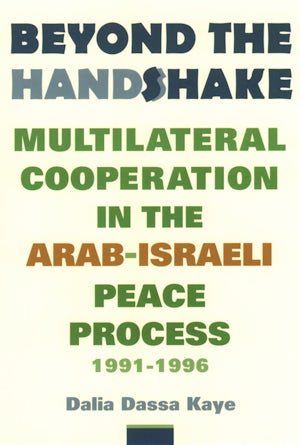

- Price: $36.00
- Pages: 256
- Carton Quantity: 22
- Publisher: Columbia University Press
- Imprint: Columbia University Press
- Publication Date: 29th March 2001
- ISBN: 9780231120036
- Format: Paperback
- BISACs:
POLITICAL SCIENCE / International Relations / Treaties
HISTORY / Middle East / Israel & Palestine
HISTORY / Middle East / General
POLITICAL SCIENCE / Peace
Kaye's approach provides significant insight into the rationale behind each state's involvement in and expectations from multilateral negotiations...Beyond the Handshake is a solid contribution to the subject.- Scott Rothstein, Arab Studies Journal
Kaye has produced a perceptive account of... the multilateral track in light of current paradigms of international relations.- Israel Affairs
Theoretical and descriptive.- Journal of Palestine Studies
Preface
Introduction
1. Explaining Regional Multilateral Cooperation
2. The Historical Record: Pre-Madrid Regional Cooperation
3. The Origins of the Arab-Israeli Multilateral Talks
4. Regional Security Cooperation
5. Regional Economic Cooperation
6. Water and Environmental Cooperation
7. Conclusion
Appendix A: Concluding Remarks by Secretary of State James A. Baker III Before the Organizational Meeting for Multilateral Negotiations on the Middle East
Appendix B: Article 4: Security. Treaty of Peace Between the State of Israel and the Hashemite Kingdom of Jordan
Appendix C: Declaration of Principles and Statements of Intent on Arms Control and Regional Security
Appendix D: Statement by the Gulf Cooperation Council on the Cancellation of the Secondary and Tertiary Arab Boycott of Israel
Appendix E: Casablanca Declaration
Appendix F: Amman Declaration
Appendix G: Cairo Declaration
Appendix H: Declaration on Principles for Cooperation Among the Core Parties on Water-Related Matters and New and Additional Water Resources
Appendix I: The Bahrain Environmental Code of Conduct for the Middle East
Notes
Selected Bibliography
Index
- Price: $36.00
- Pages: 256
- Carton Quantity: 22
- Publisher: Columbia University Press
- Imprint: Columbia University Press
- Publication Date: 29th March 2001
- ISBN: 9780231120036
- Format: Paperback
- BISACs:
POLITICAL SCIENCE / International Relations / Treaties
HISTORY / Middle East / Israel & Palestine
HISTORY / Middle East / General
POLITICAL SCIENCE / Peace
Kaye's approach provides significant insight into the rationale behind each state's involvement in and expectations from multilateral negotiations...Beyond the Handshake is a solid contribution to the subject.– Scott Rothstein, Arab Studies Journal
Kaye has produced a perceptive account of... the multilateral track in light of current paradigms of international relations.– Israel Affairs
Theoretical and descriptive.– Journal of Palestine Studies
Preface
Introduction
1. Explaining Regional Multilateral Cooperation
2. The Historical Record: Pre-Madrid Regional Cooperation
3. The Origins of the Arab-Israeli Multilateral Talks
4. Regional Security Cooperation
5. Regional Economic Cooperation
6. Water and Environmental Cooperation
7. Conclusion
Appendix A: Concluding Remarks by Secretary of State James A. Baker III Before the Organizational Meeting for Multilateral Negotiations on the Middle East
Appendix B: Article 4: Security. Treaty of Peace Between the State of Israel and the Hashemite Kingdom of Jordan
Appendix C: Declaration of Principles and Statements of Intent on Arms Control and Regional Security
Appendix D: Statement by the Gulf Cooperation Council on the Cancellation of the Secondary and Tertiary Arab Boycott of Israel
Appendix E: Casablanca Declaration
Appendix F: Amman Declaration
Appendix G: Cairo Declaration
Appendix H: Declaration on Principles for Cooperation Among the Core Parties on Water-Related Matters and New and Additional Water Resources
Appendix I: The Bahrain Environmental Code of Conduct for the Middle East
Notes
Selected Bibliography
Index

